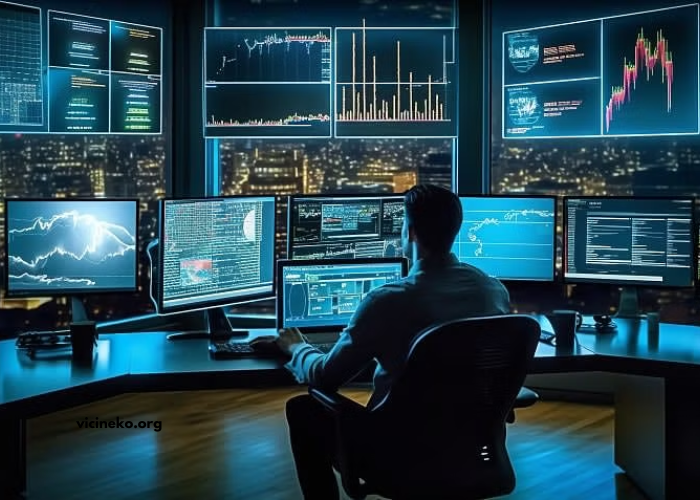The rapid evolution of technology has fundamentally transformed the way we live, work, and interact. As we approach 2025, we can expect even more groundbreaking innovations that will reshape industries, economies, and society as a whole. From artificial intelligence (AI) and automation to blockchain and quantum computing, the technologies that are emerging today will have a profound impact on the future. In this article, we will explore the top technology trends that are expected to shape the future in 2025 and beyond.
1. Artificial Intelligence and Machine Learning
The Rise of AI in 2025
Artificial Intelligence (AI) has been one of the most transformative technologies of the past decade, and its role in society will only continue to expand by 2025. AI encompasses a wide range of technologies that enable machines to simulate human intelligence, such as natural language processing (NLP), computer vision, and deep learning.
AI is already making waves in industries such as healthcare, finance, retail, and transportation. In 2025, we can expect AI to become even more advanced, leading to smarter automation, improved decision-making, and enhanced customer experiences. AI-powered chatbots, virtual assistants, and predictive analytics will become even more integrated into our daily lives.
Machine Learning’s Growing Impact
Machine learning, a subset of AI, allows systems to learn and improve from experience without explicit programming. In 2025, machine learning algorithms will be more sophisticated, enabling businesses to gain deeper insights from data and automate tasks that were once performed manually.
For example, machine learning models will play a critical role in personalized marketing, fraud detection, and cybersecurity. Companies will also leverage AI-driven predictive maintenance to reduce downtime and optimize operations.
2. 5G and Next-Generation Connectivity
The Global Impact of 5G Technology
One of the most significant technological advancements that will shape the future in 2025 is the widespread deployment of 5G networks. 5G promises to deliver ultra-fast internet speeds, low latency, and increased connectivity, enabling innovations such as smart cities, autonomous vehicles, and the Internet of Things (IoT).
By 2025, 5G will become the standard for mobile communications, providing a foundation for other emerging technologies to thrive. With 5G, we can expect faster data transfer rates, seamless video streaming, and real-time communication, enhancing everything from remote work to online education and telemedicine.
The Expansion of IoT
The Internet of Things (IoT) refers to the network of physical devices connected to the internet, such as smart home appliances, wearable devices, and industrial sensors. The deployment of 5G will accelerate the growth of IoT, enabling billions of devices to communicate and exchange data more efficiently.
By 2025, IoT will be embedded in nearly every aspect of daily life, from smart homes and healthcare devices to autonomous factories and smart transportation systems. The increased connectivity provided by 5G will allow IoT devices to operate more effectively, leading to greater efficiency, sustainability, and convenience.
3. Blockchain and Decentralized Finance (DeFi)
Blockchain Technology’s Evolution
Blockchain technology, the underlying architecture behind cryptocurrencies like Bitcoin and Ethereum, has evolved beyond its initial use case in digital currencies. By 2025, blockchain will have a significant impact on industries such as supply chain management, healthcare, and finance.
Blockchain’s decentralized nature offers enhanced security, transparency, and efficiency in transactions. In industries like finance, blockchain is paving the way for decentralized finance (DeFi) platforms, where traditional financial intermediaries like banks are replaced with peer-to-peer networks.
The Rise of Decentralized Finance (DeFi)
DeFi refers to financial services that operate without traditional intermediaries, such as banks or brokers. By 2025, DeFi platforms will continue to grow, offering a wide range of services including lending, borrowing, trading, and investing.
DeFi will provide individuals with more control over their financial transactions and increase access to financial services, particularly in underserved regions of the world. Additionally, blockchain’s transparency and immutability will make it more difficult for fraud and corruption to occur, creating a more trustworthy financial ecosystem.
4. Quantum Computing
The Promise of Quantum Computing
Quantum computing is still in its early stages, but it holds enormous potential to revolutionize fields such as cryptography, drug discovery, artificial intelligence, and material science. Quantum computers use quantum bits (qubits) instead of classical bits, allowing them to perform complex calculations at speeds that are currently unimaginable with traditional computers.
By 2025, we can expect significant advancements in quantum computing, particularly in the areas of algorithm development and hardware scaling. Quantum computers could solve problems that are intractable for classical computers, such as simulating molecular interactions for drug development or optimizing supply chains in real-time.
Impact on Security and Cryptography
Quantum computing will also have a profound impact on cybersecurity. Current encryption methods, which rely on the difficulty of factoring large numbers, could become obsolete with the advent of powerful quantum computers. As a result, organizations and governments are already working on developing quantum-resistant encryption techniques to protect sensitive data.
While quantum computing is still a long way from becoming mainstream, its potential to disrupt industries and solve complex problems is immense. By 2025, we can expect to see breakthroughs that will bring quantum computing closer to practical use.
5. Robotics and Automation
The Future of Robotics in Industry
Robots have been a part of manufacturing and logistics for years, but the next wave of robotics will take automation to new heights. In 2025, robots will become more autonomous, adaptable, and capable of handling complex tasks. The integration of AI and machine learning will allow robots to learn from their environment and improve their performance over time.
In industries like manufacturing, construction, and healthcare, robots will assist with tasks such as assembly, inspection, surgery, and patient care. Collaborative robots (cobots) will work alongside human workers, enhancing productivity and safety in workplaces.
The Role of Automation in Everyday Life
Automation will extend beyond industrial applications and into daily life. In 2025, we can expect increased automation in homes, retail stores, and transportation. For example, autonomous delivery drones and self-driving vehicles will become more prevalent, transforming the logistics and transportation industries.
At home, smart devices like robotic vacuum cleaners, automated kitchen appliances, and AI-powered personal assistants will become more common, making daily tasks more convenient and efficient.
6. Augmented Reality (AR) and Virtual Reality (VR)
The Growing Impact of AR and VR
Augmented Reality (AR) and Virtual Reality (VR) technologies are revolutionizing the way we interact with the digital world. While VR immerses users in entirely virtual environments, AR overlays digital information on the physical world. Both technologies are expected to see significant advancements by 2025.
In sectors like gaming, entertainment, and education, AR and VR will provide more immersive and interactive experiences. For example, VR headsets will allow users to engage in fully immersive gaming experiences, while AR applications will enhance shopping, learning, and travel experiences by providing real-time information and context.
Transforming Industries with AR and VR
AR and VR will also have a profound impact on industries like healthcare, real estate, and manufacturing. Surgeons will be able to perform remote surgeries with the help of AR and VR, while real estate agents will offer virtual tours of properties to potential buyers. In manufacturing, AR glasses will assist workers by displaying real-time data and instructions while they work on assembly lines.
By 2025, AR and VR will be integrated into everyday applications, creating new ways for businesses to interact with customers and improve operations.
7. Sustainable Technologies
The Shift Towards Sustainable Innovation
As the world faces the challenges of climate change and resource depletion, there is a growing emphasis on sustainable technologies. In 2025, we can expect significant advancements in renewable energy, carbon capture, and sustainable agriculture.
Solar and wind energy will continue to grow as primary sources of renewable power, while energy storage technologies like batteries will become more efficient, making renewable energy more reliable. Additionally, carbon capture and utilization technologies will help reduce emissions from industrial processes.
The Role of AI in Sustainability
AI will play a crucial role in advancing sustainability efforts by optimizing resource use, predicting energy demand, and reducing waste. For example, AI-powered systems can help utilities manage energy grids more efficiently, while AI-driven analytics can optimize agricultural practices, leading to more sustainable food production.
Conclusion
As we look ahead to 2025, technology will continue to evolve at an unprecedented pace, with innovations in AI, 5G, blockchain, quantum computing, robotics, AR/VR, and sustainability shaping the future. These trends will not only transform industries but also improve the quality of life for individuals around the world.
By embracing these technologies, businesses can stay competitive, while governments and organizations can address critical challenges such as climate change, healthcare, and economic inequality. The future is exciting, and the possibilities are endless.





